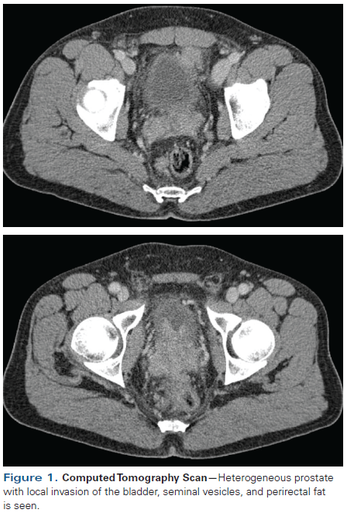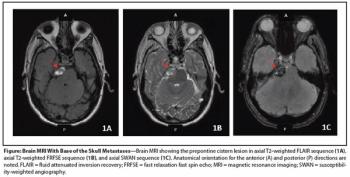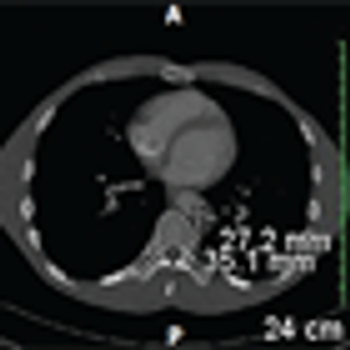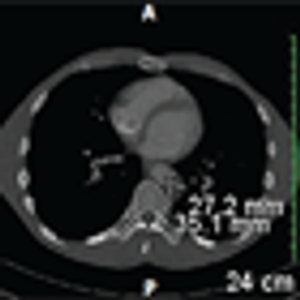L. Michael Glodé, MD, FACP
Articles by L. Michael Glodé, MD, FACP

Man With Locally Advanced, High-Risk Prostate Cancer Asks About Adding Chemotherapy to His Treatment
ByMaría T. Bourlon, MD, MSc, FASCO,Mauricio Mora,Juan Hinojosa-Fano,Braulio Martínez-Benitez, MD,Arya Amini, MD,Ricardo Castillejos-Molina, MD,L. Michael Glodé, MD, FACP A 55-year-old Hispanic male presents with a family history of gastric cancer in one sibling and prostate cancer in an older brother. CT performed in March 2015 for IMT surveillance showed a heterogeneous prostate with local invasion involving the bladder, seminal vesicles, and perirectal fat.

Thanks to the efforts of the Prostate Cancer Foundation and Movember, men of good will (especially those inclined to grow mustaches and raise awareness and funds each year) and their physicians are newly energized to make progress.

A 63-year-old man with no family history of prostate cancer has prostate biopsy that revealed 9 out of 12 cores involved with prostatic adenocarcinoma, mostly Gleason score 5+4=9.

A 22-year-old man presented to the emergency department with a 5-cm painful testicular mass that had increased in size over the previous month. Tumor markers were drawn and an inguinal orchiectomy was performed.

My thought is that it is good to move forward. No doubt there will be needed changes, but the status quo is broken.

A Rare Case of Metastatic Renal Epithelioid Angiomyolipoma
ByElaine T. Lam, MD,Francisco G. La Rosa, MD,Thomas D. Suby-long, MD,Kimi L. Kondo, DO,Shandra S. Wilson, MD,L. Michael Glodé, MD, FACP,Thomas W. Flaig, MD The patient is a 43-year-old man who was initially evaluated at an outside institution for unexplained anemia and who was found to have a large right kidney mass. He underwent a radical nephrectomy for a 19-cm large-cell, poorly differentiated neoplasm, consistent with pleomorphic, epithelioid angiomyolipoma (EAML) with extensive necrosis and cytologic atypia.

On many occasions, I have been asked by colleagues or patients, “How do you do what you do?” when the topic of taking care of patients with a terminal illness comes up. So, is it possible to write about the topic of humor in oncology without seeming cynical and uncaring? Obviously I think it is.

As a medical oncologist who entered the field when there were perhaps 50 or so active drugs, I have become increasingly disturbed by the rising costs of cancer care. Of course, I am not alone in worrying about this.

Prostate Cancer in a Man With Multiple Previous Cancers
ByThomas Flaig, MD,E. David Crawford, MD,Brian Kavanagh, MD,Scott Lucia, MD,Francisco G. La Rosa, MD,Al Barqawi, MD,Frances Crighton, RN, MSN, PhD,L. Michael Glodé, MD, FACP patient is a 67-year-old male with mild obstructive symptoms and an American Urology Association symptom score of 8.[1] He was noted to have a prostate-specific antigen (PSA) level of 3.2 ng/mL. Because this represented a significant increase in his PSA velocity (rate of change over time), he proceeded to have a biopsy, which was positive for prostate cancer. He has no other complaints and visits us for an opinion on the treatment of his prostate cancer.

A 72-Year-Old Man With Prostate Cancer
ByCraig Berman, MD,Marcus Chen, MD,E. David Crawford, MD,Frances Crighton, RN, MSN, PhD,Marshal Freeman, MD,L. Michael Glodé, MD, FACP,Andrew Kraft, MD,Scott Lucia, MD,David Raben, MD The patient, L.E., is a 72-year-old white male who has been under our care for 10 years. He initially presented to our clinic in 1992, with a diagnosis of localized prostate cancer.

Gene therapy for prostate cancer faces hurdles similar to those being encountered for other cancers and nonmalignant processes. The greatest obstacle is the identification of efficient delivery systems, since numerous animal models and cell culture systems have shown potential efficacy when most cells express the introduced genetic material. Early prostate cancers are easily accessible to gene vector introduction, and the predictable metastatic patterns of this cancer may offer additional advantages for gene therapy. This article reviews gene vectors and gene products, as well as ongoing trials of gene therapy that have recently begun in prostate cancer. [ONCOLOGY 11(6):845-856, 1997]









